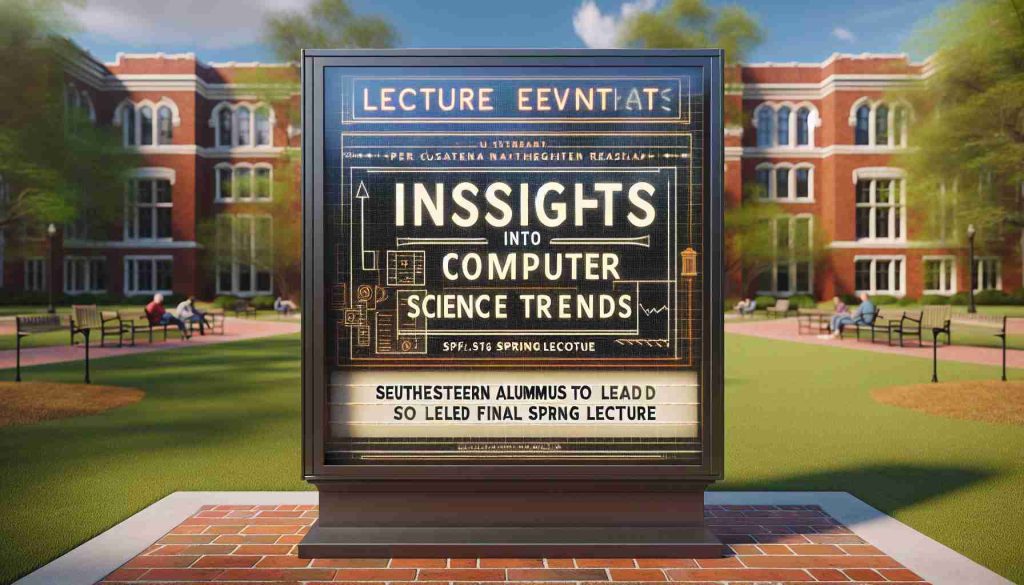
Southeastern Louisiana University’s Department of Computer Science is concluding its spring lecture series with an engaging talk poised to explore the dynamic world of computer science from the past to the future. The lecture, open to the public at no charge, is part of the Industry Connect Distinguished Lectures and is scheduled for April 18 at 4 p.m. in the Envoc Innovation Lab of the University’s Computer Science and Technology Building.
Dustin Gaspard, a computer programmer with roots at Southeastern, is the featured speaker for this final spring session. With professional programming experience dating back to his high school years, Gaspard will share valuable insights gleaned from his career trajectory. His presentation is aptly titled, “How has the industry changed since I graduated, and what are the emerging trends I’m seeing in the industry for the next twenty years?”
The lecture aims to shed light on the significant transformations in the computer science industry since Gaspard’s graduation, as well as to forecast emerging trends that could shape the sector in the coming decades. This event promises to offer a blend of reflective hindsight and forward-thinking vision, providing attendees with a unique perspective on both historical and forthcoming technological advancements.
Summary: Southeastern Louisiana University is wrapping up its spring lecture series with a spotlight on the evolution and future of computer science. Alumnus Dustin Gaspard, armed with years of experience, is slated to delve into past shifts and predict industry trends for the upcoming twenty years, sharing his expertise with students, faculty, and the community.
The Evolution and Future of Computer Science
The Department of Computer Science at Southeastern Louisiana University emphasizes the importance of lifelong learning and staying current in a rapidly evolving field. The upcoming lecture by Dustin Gaspard, a seasoned computer programmer and alum of the university, serves as a cornerstone of the Industry Connect Distinguished Lectures. On April 18th, attendees can anticipate a journey through the corridors of time in the technological realm, where past developments and theoretical future innovations intertwine.
The computer science industry has undergone significant changes over the years. From the languages used to write code to the applications developed and systems they run on, the pace of change has been swift and relentless. Gaspard’s own journey through this industrial evolution places him in an excellent position to comment on the trends that have defined the industry and those poised to shape its future.
Market forecasts
The global computer science sector is poised for growth as industries increasingly integrate technology into their operations. Automation, data analytics, machine learning, and artificial intelligence are among the trends expected to dominate the field, with the job market reflecting this shift. Research shows that employment in computer and information technology occupations is projected to grow 11% from 2019 to 2029, much faster than the average for all occupations.
Issues facing the industry
Among the issues that continue to prompt discussion within the sphere of computer science are cybersecurity threats, ethical considerations in AI, and the need for improved diversity and inclusion in tech spaces. Gaspard’s exploration of the past and predictions for the future may touch upon these concerns, offering insight into how the industry might navigate such challenges.
Related links:
For educational resources and further exploration in the realm of computer science, students and professionals alike can look towards authoritative organizations and platforms. Some essential links to these resources include:
– Association for Computing Machinery (ACM)
– IEEE Computer Society
– ScienceDaily: Computer Science News
As Southeastern Louisiana University’s spring lecture series comes to an engaging conclusion, the community is afforded a valuable opportunity. They can reflect on the milestones of computer science, as well as gaze into a future brilliantly lit by continued innovation and the endless potential of technology.

Roman Perkowski is a distinguished name in the field of space exploration technology, specifically known for his work on propulsion systems for interplanetary travel. His innovative research and designs have been crucial in advancing the efficiency and reliability of spacecraft engines. Perkowski’s contributions are particularly significant in the development of sustainable and powerful propulsion methods, which are vital for long-duration space missions. His work not only pushes the boundaries of current space travel capabilities but also inspires future generations of scientists and engineers in the quest to explore the far reaches of our solar system and beyond.










